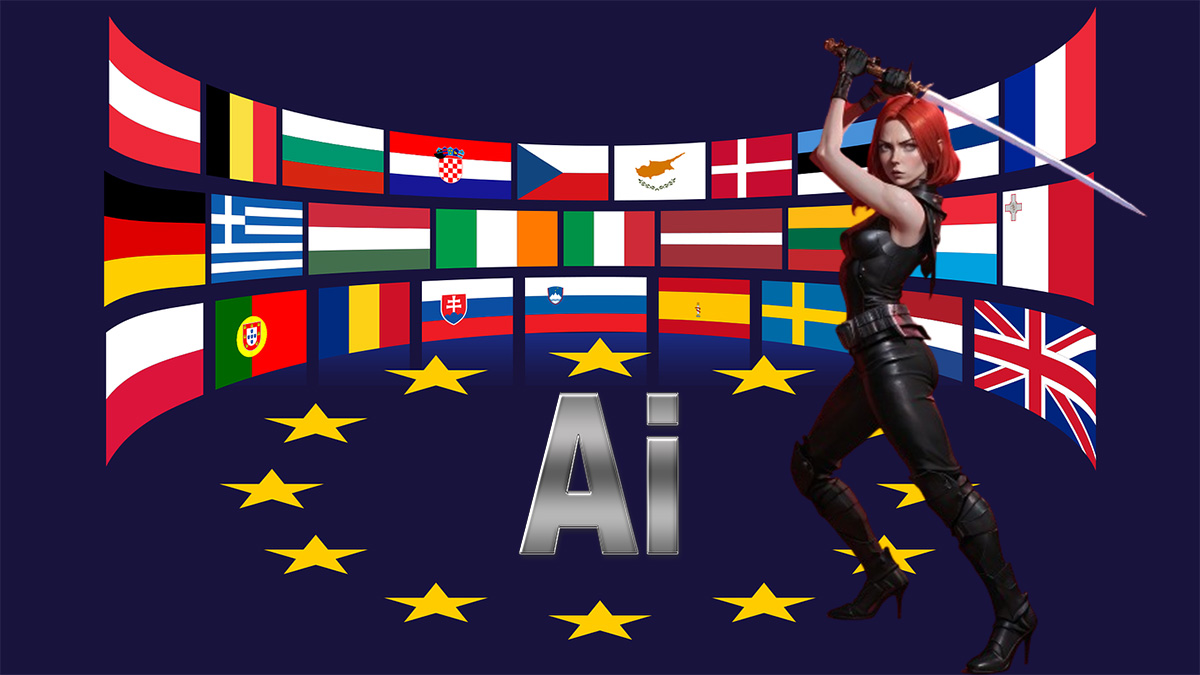The EU’s AI Act is Now in Effect for Businesses and Individuals

The European Union’s new Artificial Intelligence Act has officially come into effect, bringing significant changes for businesses and individuals alike. This groundbreaking legislation aims to regulate the use of AI technologies across various sectors to ensure transparency, accountability, and ethical standards are upheld.
Artificial Intelligence Act: MEPs adopt landmark law
The Artificial Intelligence Act approved by Parliament on Wednesday marks a significant step towards ensuring safety and compliance with fundamental rights, while also fostering innovation. With 523 votes in favor, 46 against, and 49 abstentions, MEPs have shown strong support for this regulation that aims to protect fundamental rights, democracy, the rule of law, and environmental sustainability from high-risk AI technologies.
This regulation sets out obligations for AI systems based on their potential risks and impact levels. By establishing clear guidelines and standards, Europe is positioning itself as a leader in the field of artificial intelligence. This not only ensures the ethical development and deployment of AI but also promotes innovation and growth in this rapidly evolving sector.
With a focus on safeguarding fundamental rights and promoting responsible AI practices, the Artificial Intelligence Act paves the way for a more secure and transparent digital future. By balancing innovation with ethical considerations, Europe is setting a global standard for the responsible use of artificial intelligence technology.
The EU’s AI Act is Now in Effect for Businesses and Individuals
For businesses operating within the EU, this means they must comply with strict rules on how AI systems are developed, deployed, and used. Companies will need to conduct risk assessments, provide clear explanations of their AI systems’ functionality, and ensure they do not discriminate against individuals based on factors such as race or gender.
Individuals will also benefit from the AI Act by having greater control over how their data is collected and processed by AI systems. The legislation includes provisions for data protection and privacy rights, giving individuals the power to access and correct any information stored about them by AI algorithms.
The Artificial Intelligence Act: Enhancing EU Competitiveness and Ensuring Trustworthiness
The Artificial Intelligence Act, a response to citizens’ proposals from the Conference on the Future of Europe (COFE), aims to address key issues outlined in proposal 12(10) on enhancing the EU’s competitiveness in strategic sectors. By promoting digital innovation and ensuring human oversight, the act seeks to bolster the EU’s position in crucial industries.
Additionally, proposal 33(5) highlights the importance of creating a safe and trustworthy society by countering disinformation and ensuring that humans remain in control of AI systems. The act includes safeguards to prevent misuse of AI technology and promotes responsible use to maintain trust among citizens.
Furthermore, proposal 35 emphasizes the need for promoting digital innovation while ensuring human oversight and trustworthy use of AI. The act sets guidelines for transparent practices and accountability in AI development, fostering an environment where innovation can thrive while protecting individuals’ rights.
Lastly, proposal 37(3) focuses on using AI and digital tools to improve citizens’ access to information, particularly for those with disabilities. The act aims to enhance accessibility through technology, making information more readily available to all individuals regardless of their abilities.
Overall, the Artificial Intelligence Act addresses key concerns raised by citizens in COFE proposals by prioritizing competitiveness, trustworthiness, transparency, and accessibility in AI development. By implementing these measures, the EU can foster a thriving digital ecosystem that benefits all citizens while upholding ethical standards and human values.
What does the AI Act look like?
The AI Act, proposed by the European Commission in 2020, aims to regulate the use and development of AI systems within the EU. This legislation is designed to ensure that AI technologies are safe, trustworthy, and respectful of the fundamental rights of EU citizens. By setting clear guidelines and standards for AI implementation, the AI Act seeks to promote innovation and investment in artificial intelligence across the bloc.
Under the AI Act, companies will be required to adhere to strict regulations regarding data protection, transparency, and accountability when using AI technologies. This includes conducting risk assessments, providing explanations for automated decisions, and ensuring that individuals have control over their personal data.
Additionally, the AI Act outlines specific requirements for high-risk AI applications such as biometric identification or critical infrastructure management. These applications will be subject to additional scrutiny and oversight to minimize potential risks to individuals and society as a whole.
Overall, the AI Act represents a significant step towards creating a regulatory framework that fosters responsible AI development while protecting the rights and interests of EU citizens. By promoting ethical practices and ensuring transparency in AI usage, this legislation aims to build trust in artificial intelligence technology and drive innovation in the European Union.
Where does generative AI fall into all of this?
Generative AI, also known as general-purpose AI, plays a significant role in the technological landscape. These models have the ability to complete tasks at a level close to human capabilities, making them valuable tools for various industries. However, with great power comes great responsibility.
The AI Act defines general-purpose AI models as those capable of generating text, images, and other content. While these models offer innovative opportunities, they also raise concerns for artists, authors, and creators regarding the creation and distribution of their work.
To address these concerns, generative AI models are subject to strict requirements under EU copyright law. Additionally, routine testing and cybersecurity measures are necessary to ensure the safe and ethical use of these technologies.
Open-source AI models like Meta’s Llama also fall under regulation but provide exceptions for developers who make parameters publicly available. This allows for greater access, usage, modification, and distribution of the model while still maintaining accountability and transparency in the process.
In conclusion, generative AI has immense potential but must be carefully regulated to protect intellectual property rights and ensure responsible use in our rapidly evolving digital world.
How are U.S. tech companies impacted?
The impact of the AI Act on U.S. tech companies is significant, as many of the advanced AI systems are developed by companies such as Apple, Google, and Meta. These companies play a crucial role in shaping the future of artificial intelligence technology. However, the new regulations will not only affect these tech giants but also businesses that use AI or develop their own systems.
Meta’s decision not to release its multimodal AI models in the EU due to regulatory uncertainties highlights the challenges that tech companies face in navigating complex legal environments. Similarly, Apple’s decision to withhold its new AI features in response to the Digital Markets Act underscores the need for clarity and consistency in regulations governing AI technologies.
The implications of these decisions extend beyond Europe, as companies outside the bloc may also be impacted by restrictions on using Meta’s models. Despite these challenges, Meta remains committed to making its text-only version of the Llama 3 model available in the EU, demonstrating a willingness to adapt to regulatory requirements while continuing to innovate in the field of artificial intelligence.
In light of these developments, it is clear that U.S. tech companies must carefully consider how they navigate regulatory landscapes to ensure compliance while continuing to drive innovation and growth in the global AI market. The decisions made by Meta and Apple serve as a reminder of the importance of staying informed and proactive in addressing regulatory challenges in an ever-evolving technological landscape.
What are the penalties for not following the rules?
Not following the rules outlined in the AI Act can result in significant penalties for companies. These penalties are designed to ensure compliance and accountability in the use of artificial intelligence technology.
If a company breaches the AI Act, it faces a fine that is calculated based on either a percentage of its global annual turnover from the previous financial year or a predetermined amount – whichever cost is higher. The fines can range from 35 million euro ($38 million) or 7% of global turnover, to 7.5 million euro ($8.1 million) or 1% of turnover.
These penalties serve as a deterrent for companies to adhere to the regulations set forth in the AI Act and prioritize ethical and responsible use of AI technology. It is crucial for businesses to understand and comply with these rules to avoid facing costly consequences for non-compliance.







